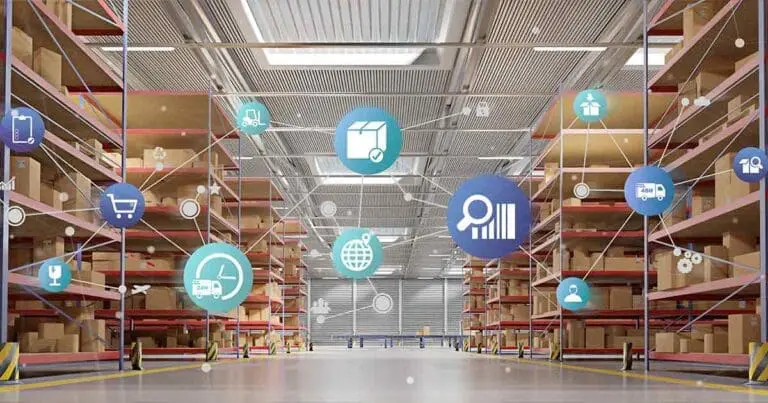Leveraging Blockchain in Supply Chain Management: Benefits and Roles

With the emergence of blockchain technology, supply chain management has seen a dramatic shift.
Companies are leveraging this cutting-edge technology to revolutionize their operations, from improving the efficiency of product tracking to increasing transparency across the chain.
It is essential for employers to take advantage of blockchain’s ability to streamline supply chain processes and create secure systems for transactions.
Explore how blockchain is revolutionizing supply chain management and discover the key roles every employer should have in place to maximize its potential.
Everything you need to know about blockchain in supply chain management:
What is supply chain management?
Supply chain management (SCM) is a strategic approach to overseeing and optimizing the entire lifecycle of products, from procurement of raw materials to production, distribution, and final delivery to customers.
Employers and hiring managers should understand the importance of SCM, as it ensures a seamless flow of goods and services across the value chain, minimizing operational costs, reducing lead times, and enhancing customer satisfaction.
Effective supply chain management can provide a competitive advantage for businesses by streamlining processes, reducing the risk of interruption, and promoting transparency.
In the context of the digital era, incorporating innovative technologies like blockchain can further improve the efficiency and security of supply chain systems, transforming the way businesses operate and compete in today’s global market.
Benefits of blockchain in supply chain management
Benefits of using blockchain in supply chain management include enhanced transparency and security, improved traceability, and improved customer experience.
- Enhanced transparency
- Enhanced security
- Improved traceability
- Increased efficiency
- Better inventory management
- Increased trust and collaboration
- Supply chain financing
- Sustainability and ethical sourcing
- Improved customer experience
Enhanced transparency in supply chain management
By implementing blockchain technology, companies can create decentralized ledgers that allow for secure and transparent tracking of goods and transactions.
Each transaction is recorded on the blockchain, creating an unbreakable chain of data that is tracked and verified in real-time.
This increases the visibility of the entire supply chain, making it easier to identify issues and resolve them quickly.
Enhanced security in supply chain management
The decentralized nature of the technology means that data is stored across multiple nodes, making it virtually impossible for hackers to tamper with or disrupt the system.
This increased security not only protects against cyber threats but also helps to reduce the risk of counterfeit goods and fraudulent activities within the supply chain, ensuring that products are genuine and trustworthy throughout their entire journey, from production to end-consumers.
Improved traceability in supply chain management
Data is recorded on each block of the chain, providing an indelible record that enables companies to track products from point of origin to final destination.
This improved traceability allows companies to monitor production processes, detect potential problems faster, and quickly find the root cause of any quality issues or supply chain disruptions.
Increased efficiency in supply chain management
Blockchain technology lowers the cost of creating, storing, and sharing data, which results in increased efficiency in business operations.
By eliminating the need for intermediaries during transactions and streamlining communication between trading partners, companies can save time and money on administrative processes while reducing manual paperwork.
Better inventory management in supply chain mangement
By using blockchain-based solutions, companies can better manage their inventory levels.
The technology gives companies the ability to track stock in real-time and automate processes such as order fulfillment and restocking, which helps to improve accuracy and streamline operations.
Increased trust and collaboration in supply chain management
The increased security and transparency of the blockchain-based system fosters trust between trading partners, leading to better collaboration and relationships across the supply chain network.
This can lead to improved communication, making it easier for companies to share data with each other and coordinate their efforts more effectively.
Supply chain financing in supply chain management
Using blockchain technology, companies can access faster and more cost-efficient financing from lenders.
The secure data storage and real-time tracking on the blockchain allows lenders to trust that their loans are going to reliable partners, making it easier for them to provide financing quickly and at a lower cost.
Sustainability and ethical sourcing in supply chain management
The increased transparency and traceability of blockchain technology can also be used to promote sustainability and ethical sourcing across the supply chain.
By tracking products from point of origin, companies can ensure that their goods are sourced responsibly and adhere to environmental regulations.
This makes it easier for businesses to meet consumer demands for sustainable products.
Improved customer experience in supply chain management
Blockchain technology can be used to improve customer experiences.
The increased transparency and traceability of the system allows consumers to access data about the products they buy, including where it was sourced from and whether or not it meets certain standards.
This provides customers with greater assurance that they are buying genuine products and helps them make more informed decisions.
11 blockchain jobs to hire for supply chain management
There are a number of blockchain jobs employers should consider hiring for supply chain management that include blockchain developers, contract managers, blockchain consultants, and data scientists with blockchain knowledge.
- Blockchain Developer
- Contract Manager
- Blockchain Architect
- Blockchain Project Manager
- Blockchain Consultant
- Blockchain Security Specialist
- Data Scientist with Blockchain Knowledge
- Blockchain Compliance Officer
- Blockchain Integration Specialist
- Blockchain Auditor
- Blockchain Analyst
1. Blockchain developer for supply chain management
A blockchain developer is responsible for developing, testing, and maintaining distributed computer networks that use blockchain technology.
They must have a deep understanding of the technology and its applications, as well as experience with coding in languages such as Python and Solidity.
2. Contract manager for supply chain management
Contract managers are responsible for managing the contracts between companies in a supply chain.
They must understand the legal implications of each contract and ensure that all parties involved adhere to them.
3. Blockchain architect for supply chain management
A blockchain architect is responsible for designing and developing the framework for a blockchain-based system.
This includes developing the architecture, protocols, consensus algorithms, APIs, and other related components.
4. Blockchain project manager for supply chain management
A blockchain project manager is responsible for planning, coordinating, and executing the development of a blockchain system.
They must be knowledgeable about both the technical aspects of blockchain technology as well as the supply chain processes associated with it.
5. Blockchain consultant for supply chain management
A blockchain consultant is responsible for advising companies on how to best utilize blockchain technology.
They must have a deep understanding of the technology and its potential applications to supply chain management in order to provide accurate advice.
6. Blockchain security specialist for supply chain management
A blockchain security specialist is responsible for ensuring that distributed computer networks are secure and compliant with regulations.
They must have an expert understanding of blockchain technology, cryptography, and data security protocols in order to protect the system from potential threats.
7. Data scientist with blockchain knowledge for supply chain management
Data scientists with blockchain knowledge are responsible for analyzing complex datasets and developing solutions based on their findings.
They must have a strong understanding of both data science techniques as well as the applications of blockchain technology to supply chain management in order to provide accurate insights.
8. Blockchain compliance officer for supply chain management
A blockchain compliance officer is responsible for ensuring that a distributed computer network follows all applicable laws and regulations.
They must have an understanding of the legal implications of using blockchain technology in order to ensure that the system remains compliant with all necessary regulations.
9. Blockchain integration specialist for supply chain management
A blockchain integration specialist is responsible for ensuring that distributed computer networks are integrated with existing systems.
They must have expertise in both software development and blockchain technology in order to bridge the gap between legacy systems and new technologies.
10. Blockchain auditor for supply chain management
A blockchain auditor is responsible for ensuring that distributed computer networks are secure and operating correctly.
They must have a deep understanding of blockchain technology and be able to analyze the system for any potential security flaws or performance issues.
11. Blockchain analyst for supply chain management
A blockchain analyst is responsible for analyzing data from distributed computer networks and providing insights on their findings.
They must have a strong understanding of the underlying technology as well as its potential applications to supply chain management in order to provide accurate insights.
The future of blockchain in supply chain management
Blockchain technology has the potential to revolutionize supply chain management.
By leveraging its benefits, companies can reduce costs, increase transparency, and create more efficient processes.
Companies should look to hire individuals with expertise in blockchain technology as well as those with experience in the supply chain industry in order to maximize the potential of this innovative technology.
Looking to hire top-tier Tech, Digital Marketing, or Creative Talent? We can help.
Every year, Mondo helps to fill over 2,000 open positions nationwide.
More articles about hiring and industry trends:
- Data Analyst vs Data Scientist: Importance, Roles, and Salaries
- Keeping Up with Cybersecurity Compliance: Deadlines and Examples
- Everything You Need to Know About SAP HANA Migration
- How Cloud Computing Solutions Provide Scalable IT Infrastructure
- Google Analytics 4: What Your Organization Needs To Prepare
- Challenges Faced by the Banking Industry in the Digital Age
- Salesforce Admin Jobs to Hire to Get the Most Out of Your Investment
- Benefits of Digital Transformation in Healthcare with Examples
- HR Technology in Hiring: Streamlining Your Recruitment & Onboarding



